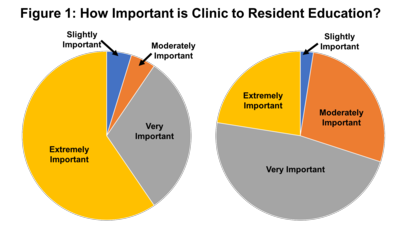C1 - 02: SURGERY EDUCATION QUALITY IMPROVEMENT THROUGH A RESIDENT-CENTERED CLINIC
Meredith Barrett, Lisa Leininger, Hadley Stoll, Angela Hayley, Christopher J Sonnenday, Paul G Gauger, Gurjit Sandhu; University of Michigan
Introduction: The field of surgical education is in the midst of significant advances in strategic teaching and academic study. In the current landscape of decreased duty hours and increasingly complex diseases, innovative methodologies have helped optimize intraoperative teaching and supervised autonomy to support resident development. Despite these educational strides, there is limited data on deliberate teaching of surgical residents in the clinic setting. The outpatient clinic experience is complex, requiring high-level decision making and coordination amongst multiple providers in a defined, and often limited, time and place. We therefore sought to investigate the current experiences in clinic education at our institution.
Methods: An online survey consisting of both Likert-scale and open ended responses was sent separately to residents and faculty in the spring of 2016 using the Qualtrics® survey platform. Participation was anonymous and voluntary.
Results: 40 (29%) residents and 42 (28%) faculty participated in the online survey. Attendings more frequently stated that clinic was important to resident education than trainees—with 90% of attendings stating that clinic was either extremely or very important to resident education whereas only 71% of residents agreed with this sentiment (Figure 1). Qualitative analysis revealed the major barriers of the clinic experience were inconsistencies in resident expectations, lack of autonomy, limited time, and facility limitations (lack of space and computers).
Conclusions: Surgical residents and faculty have differing opinions regarding the importance of clinic in residency education. Multiple themes have been identified as problematic for the resident education experience. Modifiable concerns include clarifying resident expectations and increasing resident autonomy.
Next Steps: To improve the resident educational experience, our institution has implemented a resident-centered clinic. Appointments have been modified to allow for increased time per patient to increase resident autonomy in their clinic visit. Residents are expected to prepare for visits prior to clinic—reviewing notes, labs, and imaging. We have constructed a pre/post-intervention survey to assess if this resident-centered experience is superior to our current standard.

